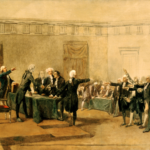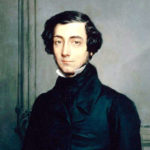There are many reasons why Indiana Jones became an iconic character after his debut in the 1981 Raiders of the Lost Ark, but one of them is because he is an archaeologist and a historian. The contrast between the whip-wielding adventurer and his chosen profession made a beautiful irony, since the stereotype of the historian is the exact opposite of Indy. For all the crazy theories that some historians hold, for all the lies that have been told under the guise of history (think Howard Zinn), the image of the historian is careful and fussy: only going where the facts lead. The field of history, it can be argued, is by nature conservative in the best sense of the word—prudent, logical, imaginative, and eager to spread its knowledge to others. Changing the world is not on the bucket list for most historians.
The New York Times’s 1619 Project, initiated this August, was the exception that proved the rule. The series of essays and poems regarding the history of black slavery in America declared from the outset that its entire purpose was to:
reframe the country’s history, understanding 1619 [when the first African slaves were brought to America] as our true founding, and placing the consequences of slavery and the contributions of black Americans at the very center of the story we tell ourselves about who we are.
Nikole Hannah-Jones, the creator of the project, insisted that the founding ideals of the United States were lies, only made true by the work of black Americans, and that the entire American Revolution was just an eleventh-hour action taken by the colonists to preserve slavery from the progressive mindset of Great Britain. Matthew Desmond traced the beginnings of American capitalism to the antebellum plantations. And Jamelle Bouie argued that the Tea Party and the opposition President Obama faced came from the legacy of slavery, a founding idea which dictated that some people deserved more power than others.
Start your day with Public Discourse
Sign up and get our daily essays sent straight to your inbox.When the Project was unveiled and rolled off the presses, many commentators on the right raised their hands to provide au contraires to its messages. But those raised hands, those attempts to stand athwart a history that was being reframed from under their very feet, could be seen as the usual reaction triggered by some new initiative on the left. The same cannot be said for the prominent historians who have come out opposing the 1619 Project.
Civil War scholar, James McPherson, for example, in an interview with the World Socialist Website, said:
I’d say that, almost from the outset, I was disturbed by what seemed like a very unbalanced, one-sided account, which lacked context and perspective on the complexity of slavery, which was clearly, obviously, not an exclusively American institution, but existed throughout history. And slavery in the United States was only a small part of a larger world process that unfolded over many centuries.
He continued, saying that Nikole Hannah-Jones’s assertion that racism was in the DNA of Americans was an absurd statement to make, since, going back to the Quakers of the eighteenth century, there has been a long tradition of white Americans who have fought slavery, segregation, and racism.
Gordon S. Wood, a professor of the American Revolution, made similar complaints about the 1619 Project. In an interview—again with the World Socialist Website—Wood made mincemeat of some of the Project’s central claims, explaining, for example, that after the Revolution, the common consensus in the North and South was that slavery was on the way out (just as bonded servitude was being abolished). In addition, Britain was not the enlightened leader of the anti-slavery cause—it did not abolish slavery in its own borders until 1833—and might not have been if the American Revolution had not occurred. And the idea that the American Revolution was ignited solely to preserve slavery requires creating an entire world view from only a thimbleful of evidence (namely the Somerset ruling of 1772).
Both McPherson and Wood are eminent American historians and recognized experts in their chosen specialties. Both men have written dozens of books and articles diving into the intricacies of the Revolution, the Early Republic, and the Civil War over the course of decades. Both have won Pulitzers and held teaching positions in some of our most prestigious institutions.
Because of their credentials, accomplishments and prestige, the only reaction Nikole Hannah-Jones, the aforementioned brains behind the 1619 Project, could muster, was to completely disregard the analyses of McPherson and Wood. In a series of tweets, Jones attacked McPherson—whom she insultingly called “a single historian”—for only skimming the Project, asking “where else would such a lack of rigor stand?” (Jones ignored McPherson’s reason for only skimming—“I read a few of the essays and skimmed the rest, but didn’t pursue much more about it because it seemed to me that I wasn’t learning very much new.”) Jones then insinuated that the only reason why McPherson got away with this skimming was because he was a white man, saying “As a black woman, I literally cannot *imagine* sitting down for a recorded interview on a major work that I haven’t bothered to read thoroughly,” before firing her main point: McPherson’s ease at only skimming the Project and people sharing his interview was only “demonstrating why this project must exist.”
Jones’ reaction shows that the 1619 Project’s goal is not just the reframing of American history, but of the philosophy of history itself. Writing for the American Historical Association in 1998, Sir Peter Stearns listed six reasons why studying history was still necessary even in the nascent digital age. The two most important reasons were these: it creates and preserves a national identity, and it imparts moral knowledge.
Memory, contrary to what some psychologists and philosophers argue, is not what makes us a person. At the dawn of our conception, biologically and metaphysically, we are a unique human person. But memory is one of the key ways by which we fight and win our nature as unique persons, to paraphrase Jacques Maritain. Because memory is the recording of events and actions, it first ties our personal life together in a chronological cohesion, burning a line from the present to the past. But because memory is the recording of actions that we have taken, and of events that have happened to us, it is also a primary way by which we win our individuality. Even people who experience an event together—a marriage or a burning building—are not marked in the exact same way by the event, since their personal stories were in different places when the event happened.
History does the same thing, but on a national scale. While people in numerous countries have drawn inspiration from it, the American Revolution formed Americans in a more intimate way. In the same way, the Third Reich affected the entire world, but it uniquely marked the German people, leaving them a legacy they can never escape. National history unites the individuals in a country into a single people, much as genealogy unites a family. It gives individuals with personal disparities a commonality that can glue them together.
The moral knowledge that Stearns talks about expresses the Founders’ own view of history: that it was philosophy or experience acted out on the stage of life. John Adams, in his Defense of the Constitution, said: “The History of Greece should be to our countrymen what is called in many families on the Continent, a boudoir, an octagonal apartment in a house, with a full-length mirror on every side. . . .” Since human nature is constant, Adams saw history as a mirror in which we can learn from the past.
The only way that history can actually perform these functions is if it is done correctly. R. G. Collingwood in his book, The Idea of History, writes that, like every science, history starts from a place of ignorance that forces the historian to ask questions and investigate the past. And that investigation can only be done as David McCullough has said, by “marinating your head” in the past, with the thoughts and lives of the people you are researching. Primary documents in the form of newspapers, speeches, letters, diaries, are the historian’s bread and butter in this regard. Without them, we can speculate and hypothesize—but we cannot reach a conclusion.
Historians are not just mechanical parrots who repeat past events to bored university students. Instead, they act as a bridge between the past and the present, so that moral knowledge and the national identity of a people may be brought into contemporary times. T. S. Eliot described the past as being “tongued with fire beyond the language of the living.” Historians are our equivalent of the Vestal Virgins, who kept the sacred fire alive in the center of ancient Rome; they are the ones who deal with the past on a daily basis and who translate it, to the best of their abilities, for today.
Nikole Hannah-Jones turns all of this on its head. In her Twitter response to McPherson, she swept away the facts that McPherson and Wood brought to the table, and simply declared that their critique of the 1619 Project was proof of why it needed to exist in the first place. In Jones’s view, the actual facts that history teaches are not only unimportant but an actual danger—not to history, but to the narrative that she pushes. History, in her hands, is not a teacher or a source of identity; it is a tool of social justice that exists to advance an ideological vision of justice.
This destroys the two primary reasons why history is vital for us. If all that matters is an ideological narrative, one that must trump even the basic facts in order to be successful, then it is impossible to learn from history. The mirror that John Adams spoke of becomes a fun-house glass that reflects only what we want to see instead of what actually is. But if we cannot learn from history, it is impossible to become wiser than the people who came before us. In a cruel irony, our species’ name, homo sapiens, becomes a joke.
If a narrative trumps the facts, it also means that our identity is not solid. Interpretations of history can and do change; the two hundred plus years of American history have seen the ebb and flow of numerous historiographies. But these historiographies, although all different, all came from interpretations of the historical record and were therefore plausible. Furthermore, while the historical community debated and fought over these different interpretations, the communal history of the country remained unaltered. But a radical reframing of that history in one fell swoop, as the Project intends, disintegrates and replaces the national sense of identity from which people draw. That the Project is being incorporated into school curricula is simply further proof of this.
This leads to two further and equally terrifying conclusions. Because the 1619 Project is not based on historical fact but on ideology, it can be catalogued as a fad or fashion—and fashion, as Oscar Wilde pointed out, is something so hideous it has to be changed every six months. This means that someone has to be in charge of changing it to meet whatever new fad comes down the pike. The new philosophy of history inaugurated by the Project doesn’t simply steal a people’s identity; it makes that identity the personal property of an elite group of “enlightened” experts. The rest of us simply become social Frankenstein’s monsters, people without historical identities except for the ones shaped and distributed to us by our ideological masters.
One of the purposes of education is to liberate; it’s why John Adams said that self-government could only happen among an educated people. But education requires seeking, finding, and accepting reality—present and past, good and bad—for what it is. In this light, the 1619 Project is not liberating; it is enslaving. And no matter what Jones says to the contrary, devices of enslavement have no business here.














